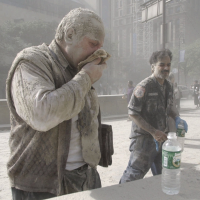Study Finds No Link between 9/11 Dust and Fumes and Cancer
 September 11, 2001 (photo: Amy Sancetta, AP)
September 11, 2001 (photo: Amy Sancetta, AP)
New York City’s health department has released a controversial report that says no link was found between cancer and those who were exposed to the dust and debris of the World Trade Center (WTC) collapse in September 2001. This conclusion comes mere months after the federal government added cancer to the list of sicknesses covered by a multi-billion-dollar health fund for survivors of the 9/11 attack.
Health officials examined more than 55,000 people, including rescue and recovery workers who worked at ground zero and helped transport the wreckage to a Staten Island landfill, as well as residents of Lower Manhattan, students, workers and others in the area on 9/11.
After reviewing all of these individuals—including 23 types of cancers in people between 2003 and 2008—the health department concluded there was no increase in the cancer rate of those studied compared to the general population. Health experts did find significantly higher rates of three kinds of cancer—multiple myeloma, prostate and thyroid—but these were limited to only rescue and recovery workers.
They also noted that the number of actual cases of these three cancers was small.
Anemona Hartocollis of The New York Times wrote that the report contained “many counterintuitive findings,” including this one: incidence of cancer was not higher among those who were exposed more intensely to the toxic substances than among those who were exposed less.
The publication of the report in The Journal of the American Medical Association occurs six months after cancer was added to the list of sicknesses covered by the $4.3 billion World Trade Center Health Program, designed to treat and compensate 9/11 survivors who suffer health problems caused by the event. The lack of evidence linking cancer to toxic debris from the twin towers’ collapse undermines the government’s decision to include cancer on the list and prompts questions about its coverage.
The WTC Program currently covers 50 different kinds of cancer, a disease that is expected to be much more costly to the program than other illnesses on the qualifying list. (The fund has earmarked $2.8 billion for victim compensation, and $1.5 billion for medical monitoring and treatment.) No payments have yet been made, but all payments must be completed no later than 2017.
Dr. Thomas A. Farley, the health commissioner in New York City, told the newspaper that it may be too early to know what the long-term health implications of the 9/11 attacks will be.
“Cancers take 20 years to develop,” Farley said, “and we might see something different 20 years down the line.”
-Noel Brinkerhoff, Danny Biederman
To Learn More:
No Clear Link Between Cancer and 9/11 Debris, Study Finds (by Anemona Hartocollis, New York Times)
Association Between World Trade Center Exposure and Excess Cancer Risk (by Jiehui Li, MBBS, MSc, World Trade Center Health Registry, Journal of the American Medical Association)
Sept. 11 Health Fund Given Clearance to Cover Cancer (by Anemona Hartocollis, New York Times)
World Trade Center Health Program: Information about the Addition of Cancer (Centers for Disease Control and Prevention)
- Top Stories
- Unusual News
- Where is the Money Going?
- Controversies
- U.S. and the World
- Appointments and Resignations
- Latest News
- Trump to Stop Deportations If…
- Trump Denounces World Series
- What If China Invaded the United States?
- Donald Trump Has a Mental Health Problem and It Has a Name
- Trump Goes on Renaming Frenzy






Comments